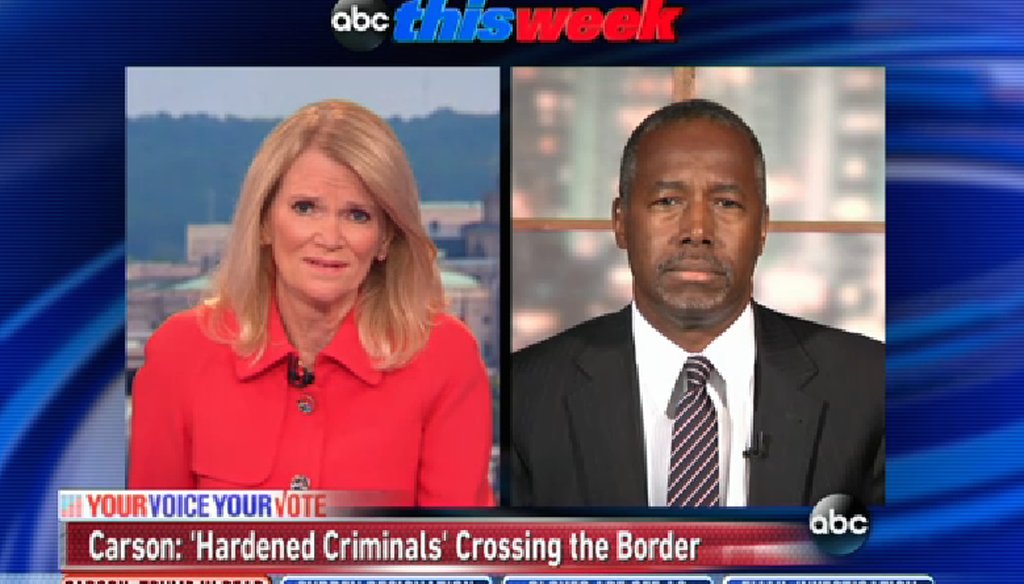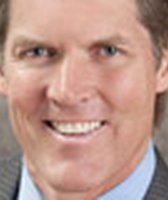Stand up for the facts!
Our only agenda is to publish the truth so you can be an informed participant in democracy.
We need your help.
I would like to contribute

Ben Carson appeared on "This Week" on Sept. 27, 2015. (ABC News)
With a new poll showing him in a virtual tie with Republican frontrunner Donald Trump, Ben Carson went on the Sunday news shows to talk politics, including to explain some of his recent comments on immigration.
On ABC’s This Week, Carson said he gets his information on immigration from local sheriffs and that he doesn’t trust information from the federal government.
"You know, a lot of these people who are captured, it's ICE (Immigration and Customs Enforcement) who comes along and says, you must release these people. And that's not helpful to the American people. They need to be working for the American people, not against them," Carson said.
Host Martha Raddatz pressed Carson, a retired pediatric neurosurgeon, on that point. But Carson didn’t back down.
"We've had examples like in Yuma County where we've been able to stop 97 percent of the illegal flow, and those programs, they abolish," Carson added. "They don't want that. What is wrong with them?"
Sign up for PolitiFact texts
His claim that the government abolished programs that allowed Yuma County to achieve dramatic reductions rates Mostly False.
As we reviewed statistics about border apprehensions, we did find a precipitous drop in immigration for Yuma County, but it took place over at least a decade. The drop matched the movement of the U.S. economy as it went from economic good times to deep recession.
The U.S. Border Patrol reported that total illegal alien apprehensions in the Yuma area went from 138,438 in 2005 to 5,902 in 2014, a decline of 96 percent. (The entire Southwest border saw a decline of 59 percent during the same time period.)
A report from the Congressional Research Service, the nonpartisan research arm of Congress, documented the decreases at Yuma and in other places since 1986; it noted that pinning down the precise causes of the decline in illegal immigration are difficult.
"The only significant decrease in unauthorized migration appears to have occurred since 2007, and it is unclear how much of the drop-off is due to increased enforcement and how much is a result of the U.S. economic downturn and other systemic factors," the report noted.
A 2014 report in the Yuma Sun noted the low number of apprehensions in the Yuma sector, but credited it primarily to increased funding for border security, specifically more money for border fencing with special technology and more agents.
Carson made reference to effective programs that had been "abolished." The closest thing we could find was a federal program aimed at prosecuting illegal immigrants that was scaled back, but not abolished.
The program, called Operation Streamline, aimed to aggressively prosecute all those who attempted to illegally cross the border, including nonviolent, first-time offenders. Yuma County Sheriff Larry Leon Wilmot said he received notice from the U.S. attorney’s office that the program was being scaled back to focus on repeat offenders and those engaged in criminal activities.
Wilmot notified members of the Arizona congressional delegation of the change, complaining it would undermine efforts at border control and would cause border patrol agents "to feel betrayed by the very government that they serve."
"This practice undermines everything that we have worked hard to achieve over the years for the citizens of Yuma County," Wilmot wrote.
Others saw the program differently, with the main criticism being it was creating backlogs in federal courts for questionable reasons.
"The program, which mainly targets migrant workers with no criminal history, has caused skyrocketing caseloads in many federal district courts along the border," argued a 2010 policy brief from the Berkeley Law School’s Chief Justice Earl Warren Institute on Race, Ethnicity & Diversity.
The Carson campaign told us that he wasn't singling out a single factor for what caused the drop in Yuma, and that the campaign stood by his statement.
Bush tax cuts
On Fox News Sunday, former Florida Gov. Jeb Bush was pressed on his tax plan, which includes rate reductions. Host Chris Wallace specifically questioned Bush about the effect tax cuts could have on the federal budget deficit.
"Whether it was Ronald Reagan's tax cuts or your brother's tax cuts, they did add greatly to the deficit," Wallace noted.
Bush responded, "They didn't as greatly as the static thinkers on the left think. They created a dynamic effect of high growth. And that's what we need."
We didn’t remember high growth during time that George W. Bush was president, so we looked at the economic data. The statistics didn’t provide support for claim that the Bush tax cuts created "high growth," so we rated the statement Mostly False.
We looked at the past five presidents’ records in average growth in gross domestic product, which is a measure of the overall economy. George W. Bush ranked fourth among the five presidents, after Bill Clinton, Reagan and George H.W. Bush. President Barack Obama came in fifth.
We also looked at two alternative measures -- the presidents’ best year of inflation-adjusted GDP growth and the number of years of inflation-adjusted GDP growth of 3 percent or more -- and found George W. Bush still trailed Reagan and Clinton.
When we checked with Jeb Bush’s campaign, they made the point that because Wallace’s question referred to both Reagan and George W. Bush, Jeb Bush’s response was intended to refer to both presidents.
But Reagan’s record on tax cuts was far more mixed than Bush’s; Reagan signed off on several significant tax increases in order to avoid budget deficits.
The Bush campaign also told PolitiFact that George W. Bush’s record is hampered by beginning with the economic impact of the 9/11 attacks and the bursting of the dot-com bubble. However, the same argument could be made -- and made even more strongly -- with the Great Recession inherited by Obama.
Finally, it’s always worth noting that a president’s impact on the economy is not all-encompassing. During the George W. Bush years, tax policy did not overtake other factors to create robust growth.
Our Sources
See fact-checks for sources.


















































